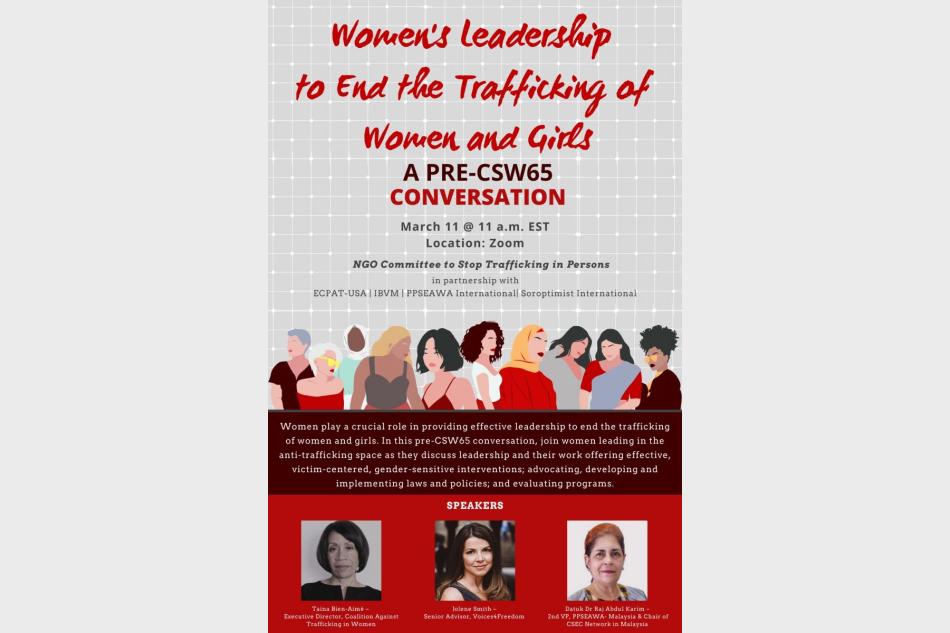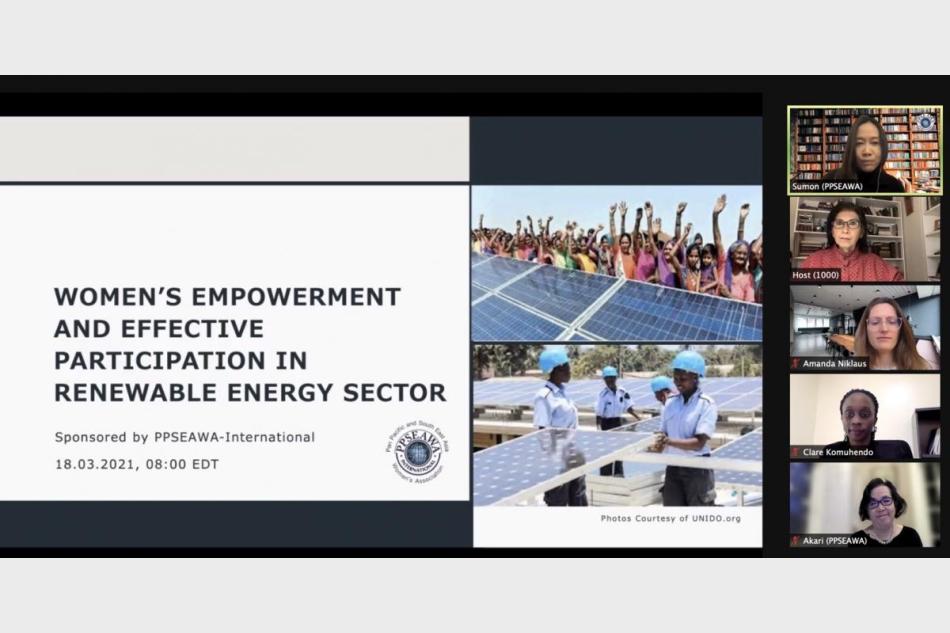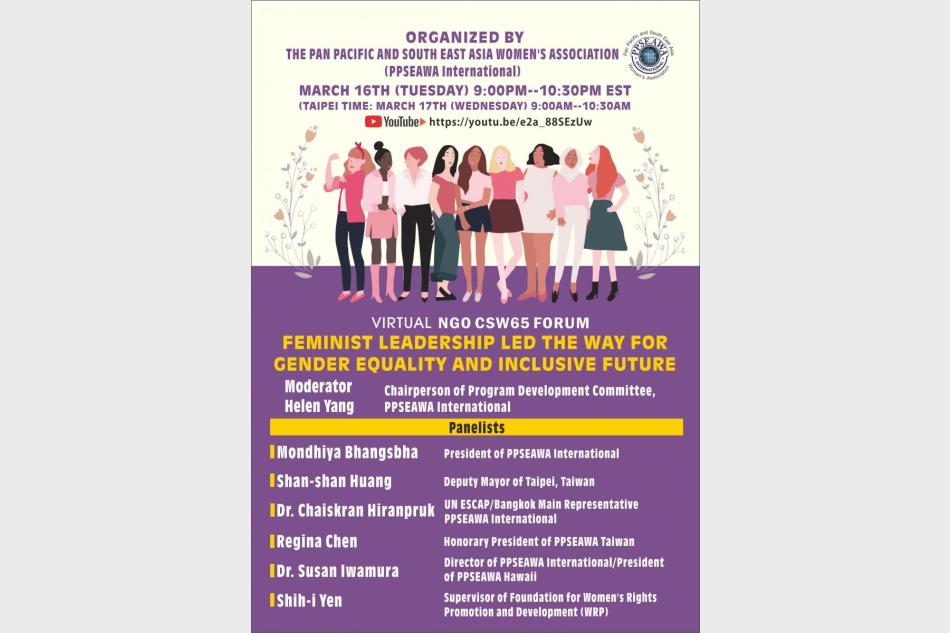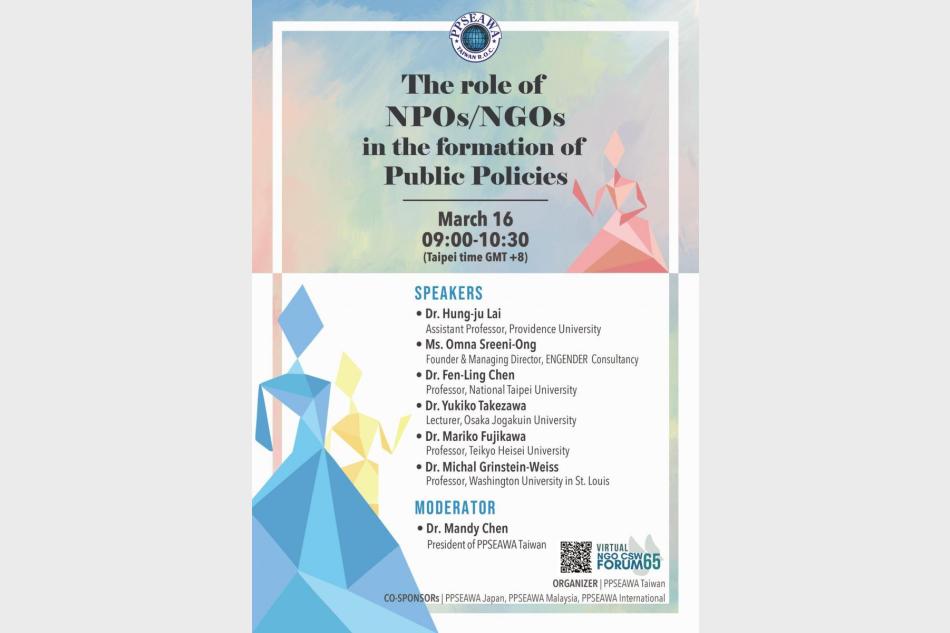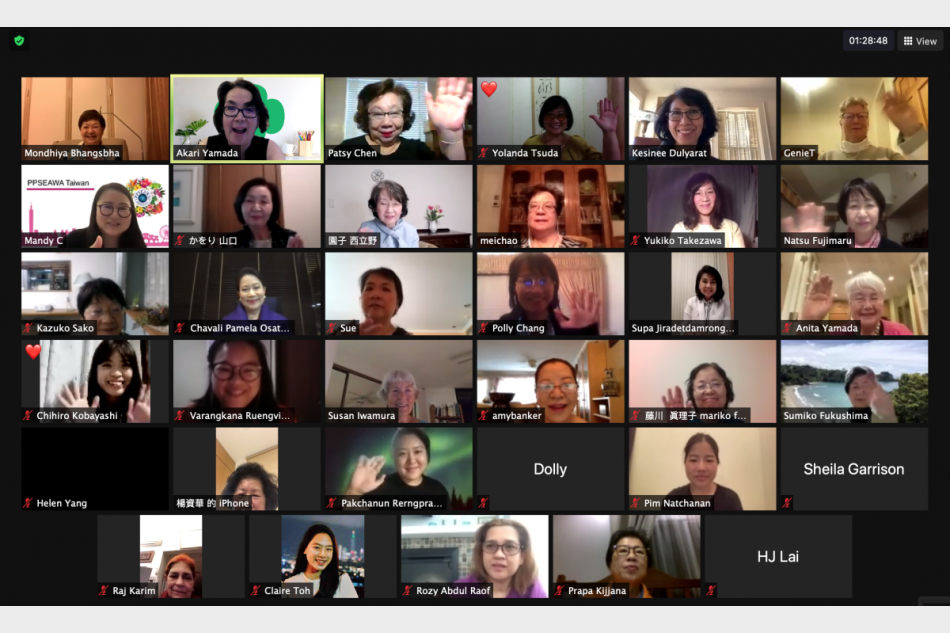The sixty-fifth session of the Commission on the Status of Women will take place from 15 to 26 March 2021 through the United Nations in New York. In light of the evolving COVID-19 situation, and taking into account the latest guidance from the United Nations Secretary-General and the World Health Organization (WHO), CSW65 will take place in a hybrid format with mostly virtual meetings.
PPSEAWA was the co-sponsor of two CSW65 Side Events:
March 16: “Women’s and Children’s Health and Well-being: Implementing Universal Health Coverage (UHC) and the Amelioration of Non-Communicable Diseases (NCDs) in the Context of COVID-19.” Organizers included the Permanent Mission of Jamaica to the United Nations; Permanent Mission of Thailand to the United Nations; WHO Office at the United Nations, New York; International Council of Women (ICW-CIF); Communications Coordination Committee for the United Nations (CCCUN); and PPSEAWA. Examples of successful and replicable programs and research from Australia, Europe, Asia, Caribbean, and U.S. were discussed that address non-communicable diseases (NCDs), esp. heart disease, cancer, diabetes, respiratory illnesses, and mental health and neurological conditions for women and children.
March 24: “We Have Your Back: Breaking the cycle from online harassment to threats to violence against women and girl leaders.” Organizer sincluded the Inter-Parliamentary Union, the League of Women Voters of United States, Albania, Australia, UN Women and NGOs: ADIN, FAWCO, IAWRT, ICJW, and PPSEAWA. Panel discussed available research on preventive actions and good practices for breaking the cycle from online harassment to threats to violence against women and girl leaders. We learned that IPU studies on violence against women in parliaments show that social media is the main channel for threats; with 41.8 per cent of women members of parliament interviewed globally and 58.2 per cent in Europe saying they had been the target of abusive, sexual or violent content and behavior on social networks such as Facebook, Twitter, Instagram, etc. Online violence against women undermines their work as public or elected officials. It also can be a barrier to women entering in the public and political arena. One conclusion was the importance of cooperation between States, information and communication technology (ICT) companies, and grassroots stakeholders.
*****
In addition, PPSEAWA was involved with several Parallel Events during the NGO CSW65 Forum, which runs concurrently. The NGO CSW Forum was created for the public to engage, discuss and share best practices how best to advance women’s and girls’ rights:
March 11: “The Crucial Role of Women in Providing Effective Leadership to End the Trafficking of Women and Girls” organized by the NGO Committee to Stop Trafficking in Persons and PPSEAWA International.
Dr. Raj Abdul Karim, 2nd Vice President of PPSEAWA International, was a panelist. She was a medical officer in the Health Ministry from Malaysia. Her research on sex trafficking illustrated a need for studies on sexual violence and its correlation to HIV infections, especially in marginalized populations. The focus for governments is on enforcement and prosecution. For example, Malaysia has an Anti-Trafficking in Persons and Smuggling of Migrants Act, a Domestic Violence Act, and Sexual Offenses Against Children Act. However, there are cracks in the system, especially in getting assistance for the vulnerable like refugees in remote areas areas on plantations and transit huts along rivers on the borders between Malaysia and countries like Thailand, Indonesia, Bangladesh, and Myanmar. Furthermore, we need to shift to more strategic means to end the exploitation of women and girls - not just respond after the fact. Policymakers need to take survivor experiences into account. Non-governmental organizations are crucial for bringing stories of survivors to governments to help identify traffickers but also in identifying victims, how best to protect survivors, and ensure prevention of exploitation. For example, Dr. Raj had been coordinating national research from Malaysia for ECPAT International, to end commercial and sexual exploitation of children, online, in tourism/travel industry, and online.
March 15: “Role of NPOs/NGOs in formation of public policies” organized by PPSEAWA Taiwan. Dr. Mandy Chen, President of PPSEAWA Taiwan, Dr. Mariko Fujisawa (PPSEAWA Japan), and Yukiko Takezawa (PPSEAWA Japan), served on this panel.
Yukiko Takezawa gave an overview of important legislation in Japan on gender equality. One highlight is the Basic Act on a Gender-Equal Society passed in 1999, which includes an action plan every five years by the Cabinet that includes meeting with non-government organizations and non-political organizations to inform policies. The most recent action plan in 2020 speaks specifically to measures to eliminate all forms of violence against women, support women facing difficult or adverse circumstances, and incorporating a holistic approach to women’s lifelong health. Dr. Mariko Fujisawa is a medical doctor and a professor at Heisei University, gave an example of how cooperation to improve women’s reproductive health services worked in the creation of the 2020 Action Plan. An OB/GYN named Dr. Kyoko Tanebe,who headed the NPO of Japan Joint Association of Medical Professional Women and was a prefectural assembly member, was part of the Cabinet’s Action Plan taskforce. The Action Plan included sex education for junior high schools, improved health literacy for menopausal and post-menopausal women, launched a one-stop support center for victims of sexual violence, and a preconception care program for vulnerable women.
March 16: “Feminist Leadership Led the Way for Gender Equality and Inclusive Future” organized by Soroptimist International and PPSEAWA. Panelists included: Mondhiya Bhangsbha (PPSEAWA International President), Regina Chen (Immediate Past President of PPSEAWA Taiwan), Dr. Chaiskran Hiranpruk (PPSEAWA Representative to the United Nations Economic and Social Commission for the Asia-Pacific), Dr. Susan Iwamura (President of PPSEAWA Hawaii), and Helen Yang (PPSEAWA’s Programme Development Committee Chairperson).
- Dr Chaiskran pointed out that countries with female leaders had the most effective response to the COVID-19 pandemic because they adopted early quarantine measures such as masking, contact tracing, and screening measures for early detection. Their successful management of the pandemic was due in part to prior investment in public health infrastructure stemming from the first SARS outbreak of 2006-2007. In the case of Thailand, there was a network of village health volunteers to disseminate information and help with screening, which was put in place under former King Bhumipol’s sufficiency economy. In fact, 80% of the one-million volunteer force are women. Moving forward in a contact-less world, it will become important to raise women’s involvement in the e-commerce marketplace. In 2020, online shopping was the highest area of economic growth for ASEAN countries.
- Regina Chen ensured a high number of female executives were hired in her securities firm. From her perspective as the chairperson, both private corporations and the government should invest in leadership and advocacy training for young women.
March 18: “Women’s Empowerment and Effective Participation in the Renewable Energy Sector” organized by PPSEAWA International. Panelists included Sumon Vangchuay (PPSEAWA Representative to UN/Geneva), Dr. Munirah Mohd Hassan (President of PPSEAWA-Malaysia/Sarawak Chapter), Kesinee Dulyarat (PPSEAWA Representative to UN/NY), and Akari Yamada (PPSEAWA International 1st Vice President).
- Dr. Sumon Vangchuay’s overview of the growth potential of the renewable energy sector pointed to the potential job areas where women can engage in the sector. The decentralized renewable energy access and localized applications of renewable energy, especially in the least-developed countries create opportunities for women. Overall, however, women remain grossly underrepresented in the value chain and the role of gender is not yet clear in the energy transition under SDGs. There are institutional and cultural barriers faced by women in the energy sector, which include lack of opportunity and inclusive policies to ensure that women are engaged and empowered.
- Amanda Niklaus (PPA Transaction Manager at Pexapark and Mentor for the Global Wind Energy Council’s Women in Wind Mentorship) illuminated the gender gap and barriers facing women in the three stages of their career: entry, retention and career advancement. She stressed the problems of workplace inflexibility and lack of access to mentorship, social network and training skills as well as highlighted positive economic impact of gender diversity in energy leadership. Policies are not gender-neutral in this sector, so it is crucial to have more women at the decision-making levels. Mentorship and affinity groups for internal support are positive business practices which help with retention of women in this industry.
- Clare Komuhendo Byaruhanga (UNCDF, Portfolio management - Energy Access) shared inspiring initiatives from Uganda on creating economic opportunities for women in renewable energy value chain. Women are being promoted as leaders, networkers, and lobbyists in the renewable energy value chain and have successfully influenced energy policy decisions at the local, national and international levels. Women are also clean energy entrepreneurs as demonstrated by a woman business leader (Simoshi Ltd) who benefits from carbon credits issued by UNFCC (United Nations Climate Change) and created a clean stove using volcanic rocks to fuel cooking. This allows her support 12 government schools by Installation of 40 institutional improved cook stoves for their school kitchens. Another project is Village Energy – a project in partnership with the Renewable Energy Challenge Fund (RECF) which used their grant to train 80 youth as solar technicians, 14 of these are women solar technicians. A great initiative to tackle gender bias in technical education.
- Gender imbalance in the energy sector is due to an unconscious bias towards women as lacking or uninterested in technical skills. Dr. Munirah Mohd Hassan, and Dr. Norseha Unin (PPSEAWA- Malaysia, Sarawak Chapter) highlighted important initiatives in promoting early STEM education among girls. They visit fishing villages to hold a STEM and ICT fair, drone demonstration, creative recycling competition and English for kids. There is iAgree mobile app to support online learning needs of children in rural schools. Community projects such as layer cakes and creative recycling, health screening and environmental talk empower the women in these remote and underserved communities, challenging gender biases and overcoming local language and cultural barriers.
March 24: “Reviewing Social and Economic Support Systems for Vulnerable Women” organized by PPSEAWA and Sroptimist International of the Americas/Taiwan region. Organizer was Helen Yang, Chairperson of PPSEAWA’s Programme Development Committee.
*****
March 15: PPSEAWA Virtual Welcome Reception
PPSEAWA International Executive Committee hosted its first virtual welcome reception for 35 participants on March 15.
One highlight of the reception was a presentation by recipients of grants from PPSEAWA’s Young Women’s Fund. Two youth members from Taiwan, Claire Toh and Gloria Lee, received a USD$1000 grant from PPSEAWA in February for their video called “Unite the Diverse”. They premiered their video during the virtual welcome reception, which tackles ethnic discrimination in Taiwan. The video is a showcase of student dancers who embrace and blend various dance styles. These PPSEAWA young women aim to bring attention to the struggles of aboriginal Taiwanese as rural minority groups who are denied certain privileges that many other Taiwanese enjoy - such as the lack of proper education and resources. They plan to use the proceeds from this video to benefit performing arts education in Taiwan for underprivileged children.

